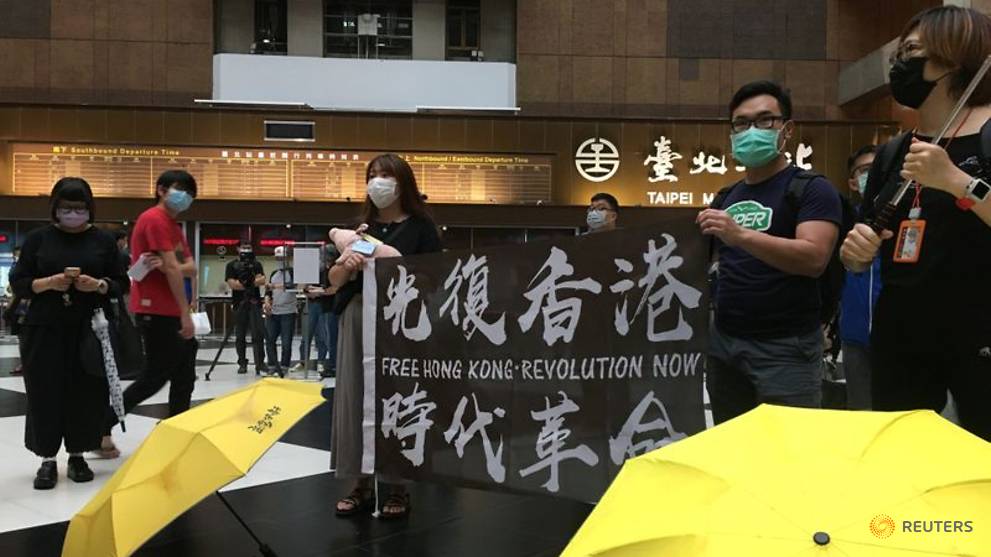
Hong Kong government warns removing US special status is 'double-edged sword'
HONG KONG: Hong Kong's government warned Washington that withdrawing its special US status, which has underpinned the city as a global financial hub, could be a "double-edged sword" and urged the United States to stop interfering in internal affairs.
The statement came as US President Donald Trump is due to announce later on Friday (May 29) his response to the Chinese parliament's advancement of national security legislation for Hong Kong, which activists and Western countries fear could erode the city's freedoms.
READ: China's parliament approves Hong Kong national security Bill
READ: Britain deeply concerned by China's security law for Hong Kong: PM Johnson's spokesman
The former British colony has been racked by civil unrest amid fears Beijing is curbing the high degree of autonomy it has enjoyed under a "one country, two systems" formula adopted when it returned to Chinese rule in 1997.
"Any sanctions are a double-edged sword that will not only harm the interests of Hong Kong but also significantly those of the US," the city's government said late on Thursday.
From 2009 to 2018, the US trade surplus of US$297 billion with Hong Kong was the biggest among all Washington's trading partners, and 1,300 US firms were based in the city, it said.
READ: US revocation of Hong Kong's special status 'barbaric': China's HK office
Beijing says the new legislation, likely to come into force before September, will tackle secession, subversion, terrorism and foreign interference in the city. It could see Chinese intelligence agencies set up bases in Hong Kong.
China's Ministry of Public Security (MPS) said it would "guide and support Hong Kong police to stop violence and restore order". Hong Kong's police have been independent from China and the MPS has no enforcement powers in the city.
The plan has ignited the first big protests in Hong Kong for months, as thousands of people took to the streets this week, prompting police to fire pepper pellets in the heart of the city's financial district to disperse crowds.
It is the city's first major unrest since the coronavirus dampened fervour this year.
INTERNATIONAL CONCERN
The Fitch ratings agency said it expected Hong Kong's economy to contract by five per cent this year, in large part because of the coronavirus, and the outlook for the operating environment for its banks was negative.
Hong Kong's Hang Seng index, which has lost about three per cent after the news of the security legislation, was down 0.711 per cent in the early afternoon.
The US Department of State said in a report on Thursday it could "no longer certify that Hong Kong continues to warrant (differential) treatment" from Beijing.
Trump's top economic adviser Larry Kudlow warned that Hong Kong, which has enjoyed special privileges under US law based on its high degree of autonomy from Beijing, may now need to be treated like China on trade and other financial matters.
Chinese authorities and Hong Kong's Beijing-backed government say the legislation poses no threat to the city's autonomy and the interests of foreign investors would be preserved.Many Hong Kong residents feel their city is on the cusp of historic change, however."No matter how it turns out, I’ll always stand on the people’s side," said Samantha Tam, 27. The office worker said the uncertainty had made her put on hold plans to have a baby after she gets married next year."When Hong Kong really loses special status, China will see the consequences. I just want to burn together," she said, paraphrasing a protest slogan aimed at Beijing: "If we burn, you burn with us."
In a separate statement on Friday, published in several local newspapers, Hong Kong leader Carrie Lam urged "fellow citizens" to "join hands to pursue our dreams while putting aside our differences".
She said the legislation was needed because of a "terrorist threat" and because organisations advocating "independence and self-determination" have challenged the authority of Beijing and local governments and pleaded for foreign interference.
The five demands of last-year's protest movement included universal suffrage and an independent inquiry into police handling of the protests, but not independence. A minority of protesters waved "Hong Kong independence" flags.
Independence is anathema for Beijing.
The security legislation, along with a Bill to criminalise disrespect for China's national anthem, are seen by protesters as the latest attempt by Beijing to tighten its control on the city.
The security legislation, expected to be enacted before September, was condemned also by Britain, Australia, Canada and others. Japan said it was "seriously concerned".
Britain said it will give greater visa rights to British national overseas passport holders from Hong Kong unless China suspends its plans.
MORE: Our coverage of the Hong Kong protests
Follow us on Telegram for the latest on Hong Kong: https://cna.asia/telegram